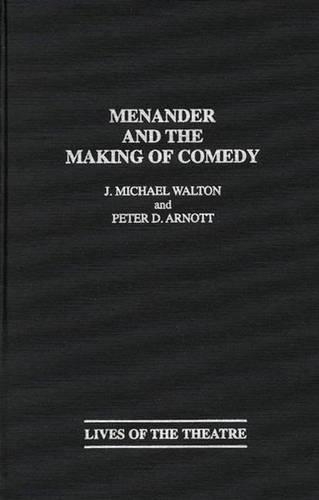
Menander and the Making of Comedy
(Hardback)
Available Formats
Publishing Details
Menander and the Making of Comedy
By (Author) J. M. Walton
Bloomsbury Publishing PLC
Praeger Publishers Inc
28th February 1996
United States
Classifications
Tertiary Education
Non Fiction
Literary studies: ancient, classical and medieval
882.01
Physical Properties
Hardback
192
Description
This introduction to the comedy of Menander is the work of two classical scholars, both of whom have worked extensively as theatre practitioners. It considers the plays of Menander primarily as performance pieces and uncovers the dramatic technique of this widely admired comic writer, whose plays had all but disappeared until the 1950s. Looking at the theatrical context of Menandrian comedy in its widest sense, the book includes discussions of recent productions, the recovery of the texts, the treatment of women and slaves, the nature of Menander's comedy, and where it may have led within the European tradition. This book should be of interest to both students of theatre and classicists.
Reviews
ues to divide scholars: W. and A. adopt a positive approach, drawing on their extensive practical experience of drama in performance. This book, in my view, the best recent work on the plays. and I would recommend it both to classicists and to students of English and European literature as a work that captures the essential spirit of Menander.-Journal
This book is, in my view, the best recent work on the plays, and I would recommend it both to classicists and to students of English and European literature as a work that captures the essential spirit of Menander.-Journal of Hellenic Studies
Written by two authors well-versed in theater scholarship and play production, this insightful reappraisal of Menander's vision of realism and of his dramaturgical masterstrokes within a formula-driven framework will appeal to those interested in theater history and the comic tradition. Walton convincingly demonstrates why Menander played well in ancient times and has been enthusiastically received on the modern stage. All collections.-Choice
"ues to divide scholars: W. and A. adopt a positive approach, drawing on their extensive practical experience of drama in performance. This book, in my view, the best recent work on the plays. and I would recommend it both to classicists and to students of English and European literature as a work that captures the essential spirit of Menander."-Journal
"This book is, in my view, the best recent work on the plays, and I would recommend it both to classicists and to students of English and European literature as a work that captures the essential spirit of Menander."-Journal of Hellenic Studies
"Written by two authors well-versed in theater scholarship and play production, this insightful reappraisal of Menander's vision of realism and of his dramaturgical masterstrokes within a formula-driven framework will appeal to those interested in theater history and the comic tradition. Walton convincingly demonstrates why Menander played well in ancient times and has been enthusiastically received on the modern stage. All collections."-Choice
Author Bio
J. MICHAEL WALTON is head of the Drama Department and Personal Professor at the University of Hull, United Kingdom. In addition to editing numerous works, he is author of Greek Theatre Practice (Greenwood, 1980), The Greek Sense of Theatre: Tragedy Reviewed, and Living Greek Theatre: A Handbook of Classical Performance and Modern Production (Greenwood, 1987). His translations have been performed in Britain and the United States, and include Menander's The Woman from Samos, produced at the Getty Museum in Malibu in 1994. PETER D. ARNOTT was Professor of Dramatic Arts at Tufts University at the time of his death in 1990. In addition to lecturing, he regularly toured with a one-man marionette theatre performing plays from the classical repertoire. Among his publications are An Introduction to the Greek World, An Introduction to the Greek Theatre, Greek Scenic Conventions in the Fifth Century B.C, The Ancient Greek and Roman Theater, The Theatre in Its Time and Public and Performance in the Greek Theatre. He also published translations from Greek, Latin, and French, many of which he directed in public productions.
